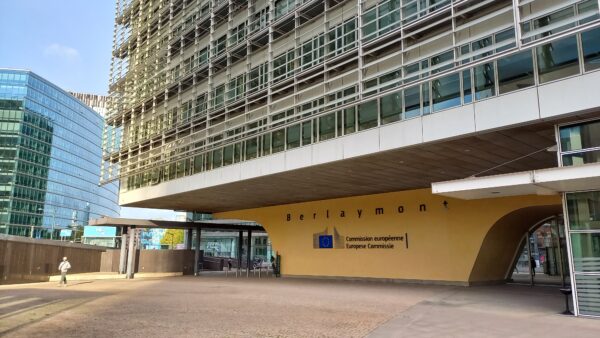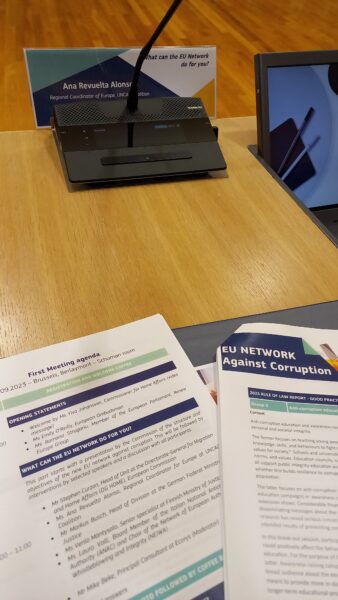9 October 2023 – by Ana Revuelta Alonso, Regional Coordinator for Europe
The European Commission launched the highly-anticipated EU Network against corruption on the 20th of September during a day-long meeting in Brussels with over 100 participants. The UNCAC Coalition was invited to speak at this inaugural meeting and shared ideas about how this network can reach its full potential.

The EU Network against corruption builds on previous experience-sharing workshops on concrete topics with a wide range of stakeholders. It is intended to become a platform for dialogue and collaboration in the fight against corruption at the European level, bringing together national authorities and EU agencies, practitioners and civil society representatives.
The network was announced last May as part of the European Commission’s anti-corruption package, a series of initiatives that convey an important boost by the European Union (EU) to advance a common culture of integrity. Indeed, over the coming months we should see the culmination of a mapping exercise on high-risk areas for corruption in the EU, the adoption of an anti-corruption directive, a new sanctions regime, the development of an anticorruption strategy for the EU, and the finalization of the UNCAC implementation review of the European Union, which is currently underway.
 At the inaugural meeting, the Commission considered different perspectives for the shaping of the network’s structure and objectives. As the only civil society representative speaking, our Regional Coordinator for Europe, Ana Revuelta, presented during the first session, emphasizing how the network can advocate for the inclusion of civil society in UNCAC bodies and implementation reviews. EU Member states as well as the European Union itself should implement the highest standards of transparency and participation in UNCAC reviews, by adhering to and most importantly by complying with the UNCAC Coalition’s Transparency Pledge.
At the inaugural meeting, the Commission considered different perspectives for the shaping of the network’s structure and objectives. As the only civil society representative speaking, our Regional Coordinator for Europe, Ana Revuelta, presented during the first session, emphasizing how the network can advocate for the inclusion of civil society in UNCAC bodies and implementation reviews. EU Member states as well as the European Union itself should implement the highest standards of transparency and participation in UNCAC reviews, by adhering to and most importantly by complying with the UNCAC Coalition’s Transparency Pledge.
The EU Network against corruption could highlight the shortcomings of the UNCAC Implementation Review Mechanism, share examples of best practices and guidance for engagement with civil society in the different phases of the process – from the government’s self-evaluation to participation in the country visits, and the publication, dissemination and follow-up of the full country report. As a multi-stakeholder platform, the EU network is best placed to ensure that civil society becomes a key partner in the implementation of anti-corruption commitments made by the states and EU institutions, starting with the recommendations coming out of UNCAC reviews.
Different perspectives and expectations concerning the creation of the EU Network against corruption emerged during the high-level meeting. In her inaugural address, Commissioner for Home Affairs Ylva Johansson highlighted the need to join forces to prevent and combat corruption. European Ombudsman Emily O’Reilly and Ramona Strugariu, Member of the European Parliament and rapporteur for the proposal for a Directive on combating corruption, underlined that winning back citizens’ trust is particularly important in a context of growing populism in the region. Other panelists included representatives from the Ministries of Justice of Finland, Germany, Estonia and the Netherlands, from national anti-corruption authorities in Italy and France, and the Anticorruption and Integrity team at the European Commission.
Several of our member organizations in Europe were also present at the meeting, with Sándor Lederer from K-Monitor (Hungary) and Sorin Ioniţă from Expert Forum (Romania) engaging in an interactive exchange on some of the good practices and trends identified in the 2023 EU Rule of Law Report. Finally, the Commission’s staff presented funding opportunities for anti-corruption projects under the Technical Support Instrument, Erasmus+ and the Internal Security Fund.
Next steps for the UNCAC review of the European Union
As the only regional organization that is party to the UNCAC, the European Union is undergoing the first cycle UNCAC review that evaluates how European institutions have implemented the Convention’s measures concerning criminalization and law enforcement, and international cooperation (UNCAC Chapters III and IV). As part of this review process, an on-site visit by peer reviewers will take place from 13-15 November and the UNCAC Coalition is working to make sure that peer reviewers have the opportunity to contrast between the self-evaluation made by the Commission not only with the views of EU officials but also with that of civil society experts.
In the coming weeks, we will keep our European network informed about possible ways to contribute to this review process, especially if the Commission sets up a channel to collect written input.



